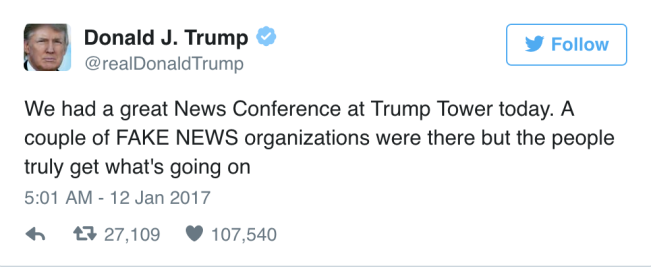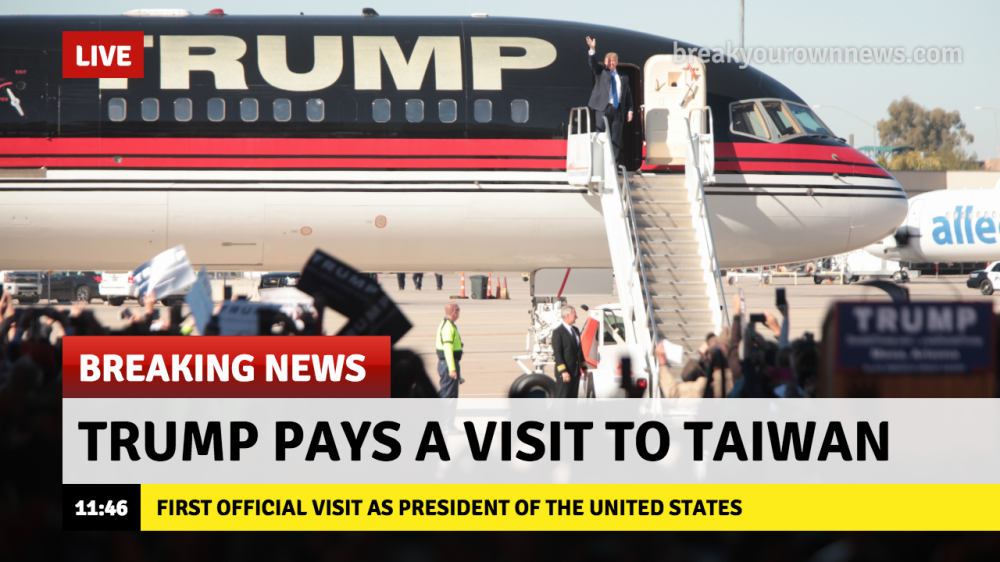Most people find their information and news on the internet through different websites. But how do you know if the news are reliable and true? How can you recognize fake news? It is important to know what to look for when you are reading an article so you will recognize it if the article adresses fake news. Fake news might mislead you into believing things that aren’t real, as well as it can affect you perspective on things like politics and democracy.
There are several different examples where fake news has effected us and our perspective. An example is how there was recently published a report about Trumps ties with Russia. Trump later stated that this wasn’t true, and accused CNN and Buzzfeed for being fake news in a press conference. Although his reaction was somewhat a little unprofessional it was still important to address that these news were fake. People who read this report was immediately lead to believing this, which probably changed their perspective on Trump and his election. Fake news are scary because it can make people more biased towards politics. When it comes to the election this year, two bad candidates came to power after being chosen because of all of the fake stories in media.

So how do you know if you are reading fake or real news? First of all, you have to know if your sources are reliable. You can check other sources, preferably big newspapers. See if other big sites has covered the same topics.You can also use browser extensions or check if the article is fact based. Check for clickbait, and last but not least be critical! It is important to not believe everything you read.
You can also spot fake news by the help of different search engines, like Google. Google recently announced that they will be launching “fact check label”. Their purpose is to divide “fact from fiction” by adding a label next to the news stories that are real and fact checked. Google will be using the claim review technique to determine whether a fact check is needed for a news story or not. This will help you spot the fake news because you will know which stories are real and which aren’t. The fact check label is a good idea considering that fact checking is something that has become very popular the last couple of years.
When it comes to the election, Norway has not been very fond of Trump and his campaign. Trump has been portrayed as very unprofessional and as a bad candidate. I think this shows how much media influence us and our opinion. Most people believe what they read and doesn’t know how to check for fake news.

In class today, we used a Padlet to write down information and everything we knew about spotting fake news. We worked with a class in the United States who also wrote down information and their thoughts on this topic. A lot of the students who wrote on the padlet agrees that fake news is a passing issue and that people believe what they want to believe, especially on social media. Fake news can easily effect peoples opinion so it is important to do the things listed further up in this post to check if what you are reading is real or not. Although, I read a remark written by Cayden that stood out from the rest of the posts. The post said that it wasn’t the fake news that were the problem, it was society itself. It says “THE REAL PROBLEM IS NOT THE “FAKE NEWS” ITS THE PEOPLE THAT BELIEVE IN FAKE NEWS”. This is a little different from the rest, but it is very interesting and maybe even true.
Students from Australia and Bergen also wrote comments on the padlet. Most of the students agreed that fake news begins with social media and that it is important to critize your sources. Although, some of the students from Australia didn’t agree that it is smart to check if other news sites has covered the same media. They thought that a lot of news sites get their information from other news articles and companies, and that if one article is incorrect the other will be as well. Some of the students from Bergen wrote that fake news is everywhere, even on the authorized news sources. They write a lot about how it can be confusing for students when they look for information because it is almost impossible to find articles that doesn’t address fake news. We also recently talked with a class in South Africa about this problem. They told us that they recently experienced fake news in their country. A news site spread fake news about schools in South Africa being affected by the illuminati and teachers drinking human blood. They listed all the schools being affected by illuminati and posted it on their website. This was of course fake, but it was very interesting to hear about other countries experiencing the same issue as we do in Norway.
Sources:
http://www.zephoria.org/thoughts/archives/2017/01/09/did-media-literacy-backfire.html
http://www.digitalpedagogylab.com/hybridped/truthy-lies-surreal-truths/
http://www.bbc.com/news/technology-37657524
The ideas based on ‘fake news’ becoming a political tool connected with previous knowledge specifically about the American election and their political problems in the media over the past few years and how fake news is on the rise in the mainstream media.
The google fact check label extended my knowledge that some companies are trying to combat fake news and make fake news easier to recognise. This combatting of fake news can potentially disrupt the fake news cycle by giving readers a stronger level of criticism so readers can draw their own conclusion about real events.
What I want to know is what news outlets do when they are found to crafted a ‘fake news’ story, are the people at the outlet given punishments because of their lack of journalism .
LikeLike
I think your article is very useful because you not only clearly reveals the problems at the moment but also provides a number of suggestions that can help us to identify the authenticity of the news. I just would like to see more your perspectives about fake news.
LikeLike
Thank you!
LikeLike